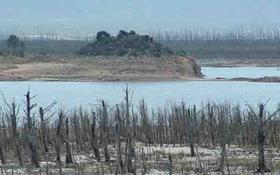
As one week after another passes without the winter rains that would replenish storage dams supplying water to the sprawling urban areas in South Africa’s Western Cape - as well as the region's agricultural sector - a huge part of the fruit industry is facing an uncertain short and long-term future.
The industry in the south-west corner of South Africa has always been used to getting its fair share of water from the major dams and the three main rivers running through the region. This includes the mid to late-season grape-growing regions, most of the apple, pear and stonefruit growing regions and a significant portion of the citrus industry.
Further away in the Landkloof, which is wedged between the Western and Eastern Cape, growers are talking of suffering from a 'once in 100 years’ drought', which has resulted in a drop of around 30 per cent in production this season. In the Eastern Cape the citrus sector is also experiencing a drop in their crop because of lingering drought.
However, right now it is the Western Cape which faces the most serious challenges. The region’s dams are less than 20 per cent full and the majority of what remains will have to be preserved for urban use.
The 2017 crops, with the exception of citrus, have been harvested and by now growers would have hoped that the first rains would have fallen to send trees into their rest period. The focus is now shifting to just how two very dry seasons and continued stress in the orchards and vineyards will affect the future crops.
“The situation for the Western Cape is quite critical at the moment and if we do not have a good, wet winter our 2018 crop will almost certainly be affected, especially in the Vyeboom-Villiersdorp area,” says Hein Keulder, chief executive of the Fruitways Group. Fruitways is a leading producer of apples and pears in the Elgin and Vyeboom region.
“The reserves in trees have probably been depleted after two very warm, dry seasons, so we will have to improve our attention to detail and precision farming techniques to optimise fertigation, irrigation and crop load management to ensure good, sustainable crops,” he adds.
In the grape-growing regions along the Berg River and the Olifants River, growers say the situation is quite desperate and will become worse if there are not sufficient rain soon. In the Hex River region growers say they are still coping because of good rains the previous winter. “However, we still have to irrigate in months were we are used to having our winter rains by now,” says Anton Viljoen Jr.
Keulder continues: “There are still many things that we can do to improve our water efficiency. The easy first step is to accurately measure our usage – if you can’t measure, you can’t manage. With the latest irrigation technologies we have already improved our irrigation scheduling and are producing more fruit with less water. Investing in and fine-tuning these systems is no longer just the right thing to do, it might be critical to our survival. In our packhouses we are already recycling a large proportion of used water and will invest further into this area.”
Keulder says at a macro level, the biggest impact can be made if the total water supply and distribution system to the City of Cape Town become more efficient with less wastage. “This requires all water users, local government, municipalities and their respective storage and distribution networks to work together. It would be difficult to achieve big wins within months, but I am encouraged by the constructive collaboration between all the different stakeholders.”
Kuelder says the Elgin-Grabouw-Vyeboom-Villiersdorp region has a large catchment area with good rainfall, but the City of Cape Town’s dependence on Theewaterskloof Dam is putting pressure on the area’s agriculture.
“I am not too concerned about prospects for the longer term because there are very progressive plans in place to improve the Western Cape’s water availability, storage and supply,' he explains. 'These plans need to be backed up by investment from the local and national government. The current water crisis will be the catalyst to transform the Western Cape and its large agricultural sector into more responsible and efficient water users for decades to come.”



